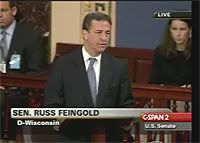Feingold Proposes Censure of Bush
 Senator Russ Feingold (D-WI) proposed a Senate resolution yesterday that would censure President Bush for his illegal domestic spying program.
Senator Russ Feingold (D-WI) proposed a Senate resolution yesterday that would censure President Bush for his illegal domestic spying program. “When the president of the United States breaks the law, he must be held accountable. That is why today, I am introducing a resolution to censure President George W. Bush,” said Feingold, in introducing his resolution. “The president authorized an illegal program to spy on American citizens on American soil. And then misled the Congress and the public on the existence and the legality of that program. It is up to this body to reaffirm the rule of law by condemning the president’s actions.”
(Crooks and Liars has some of the highlights here.)
A censure resolution, which amounts to a formal condemnation from the Congress, has been used just once in U.S. history -- against Andrew Jackson in 1834 – and is unlikely to pass given that the Senate is controlled by the same GOP that killed any investigation into the warrantless spying program in the Intelligence Committee last week.
And the right-wing smear machine has started against Feingold already using – you guessed it – any criticism of Bush as an excuse to question someone’s patriotism and say they are helping the terrorists.
"Senator Feingold's time would be better spent putting forth constructive ideas rather than using cheap political tricks that compromise America's national security by sending a dangerous signal of disunity around the globe,” said Senate Majority Leader Bill Frist (R-TN).
Apparently Frist thinks it’s a big secret in the rest of the world that our country is more divided than it has been since our own Civil War, almost 150 years ago -- and also doesn't understand that the world might actually appreciate our system of checks and balances if they could see it at work.
Republican National Committee smear merchant Tracey Schmitt, like Frist, didn’t question Feingold’s central point that the president has indisputably violated the law, but instead said that him even mentioning Bush’s illegal activity was aiding and abetting the enemy.
“Not only is Senator Feingold's approach a disservice to those who work tirelessly to protect America, it sends the wrong message to our enemies," said Schmitt.
How much support Feingold can expect from his fellow Democrats remains to be seen, but it will certainly be a bellwether for how strong and decisive the party will be going into the midterm elections and the 2008 presidential election.
Dick Durbin (D-IL) did his part on the floor yesterday, debating Republican Arlen Specter of Pennsylvania on the oft-repeated justification for Bush’s spying program that suggests he did it with implied authority from the September 18, 2001 Congressional resolution authorizing the use of force against the 9/11 perpetrators.
Said Durbin directly to Specter: “I would like to ask the Senator from Pennsylvania if he believed in casting his vote for that resolution authorizing force to pursue those responsible for 9/11 that he was giving the president authority to wiretap American citizens without obtaining the court order required by the Foreign Intelligence Surveillance Act of 1978.”
Specter’s reply: “No”
Meanwhile, Frist tried to dispose of Feingold’s resolution quickly by forcing an immediate vote without debate and was blocked by Democratic objections. Senate Minority leader Harry Reid (D-NV) said the matter deserved some debate.
"To try to limit debate on this most important matter that Senator Feingold is trying to put before the Senate is not appropriate," Reid said.
Feingold ended his floor speech by mentioning the extent to which Bush has tried to capitalize on 9/11 to further his personal agenda and reinforcing that not even the U.S. president is above the law.
“This President exploited the climate of anxiety after September 11, 2001, both to push for overly intrusive powers in the Patriot Act, and to take us into a war in Iraq that has been a tragic diversion from the critical fight against al Qaeda and its affiliates,” said Feingold. “The Constitution looks to the Congress to right the balance of power. The American people look to us to take action, to speak out, with one clear voice, against wrongdoing by the President of the United States. In our system of government, no one, not even the President, is above the law.”

















<< Home